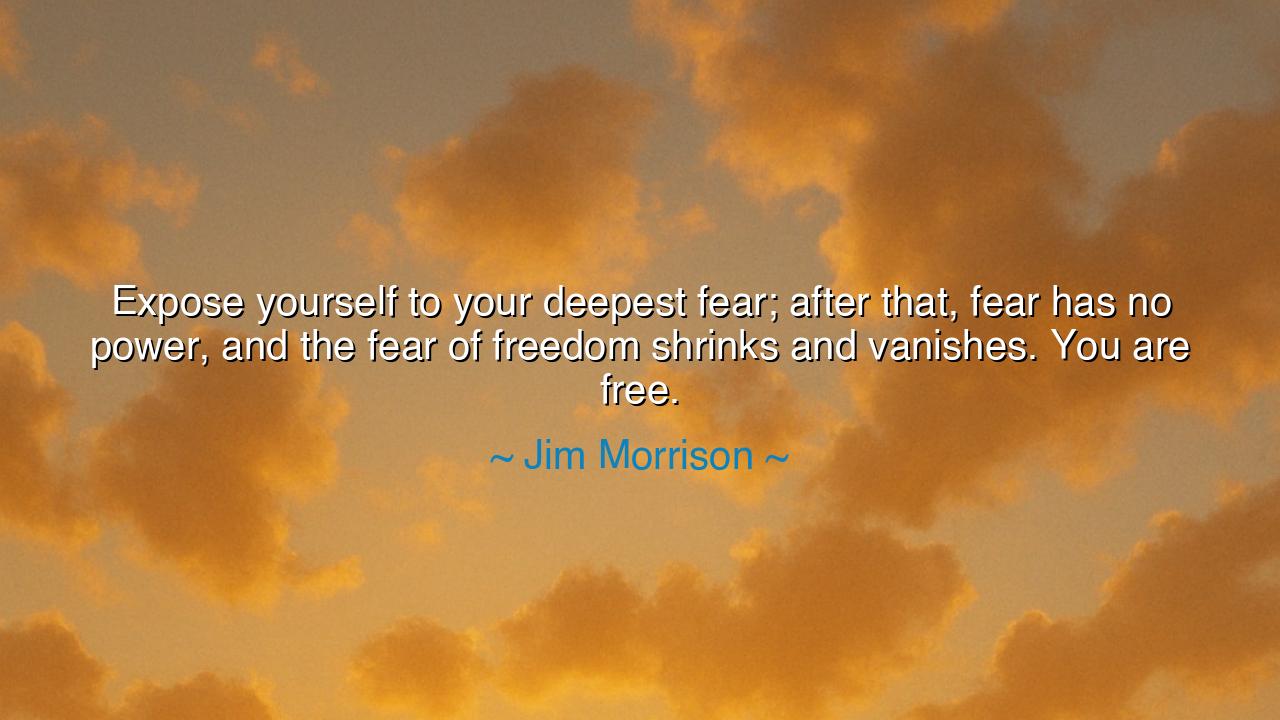
Expose yourself to your deepest fear; after that, fear has no
Expose yourself to your deepest fear; after that, fear has no power, and the fear of freedom shrinks and vanishes. You are free.






Host: The soft glow of the café lights flickered as the night settled in, the world outside humming with activity, but inside, Jack and Jeeny sat in quiet reflection. The warmth of the conversation wrapped around them like a blanket, the gentle murmur of other patrons fading into the background. Jack took a slow sip of his coffee, his eyes slightly narrowed, as if mulling over something deeper. Jeeny, sitting across from him, looked up from her cup, her gaze steady, yet thoughtful.
Jeeny: She spoke with intensity, the weight of her words settling between them. “I came across something today, Jack. A quote from Jim Morrison: ‘Expose yourself to your deepest fear; after that, fear has no power, and the fear of freedom shrinks and vanishes. You are free.’”
Jack: He raised an eyebrow, intrigued but cautious. “Expose yourself to your deepest fear? That sounds pretty intense. I mean, how can facing fear — really confronting it — set you free? Doesn’t it just make it worse?”
Jeeny: She smiled, almost gently, knowing the depth of the idea she was sharing. “I think Morrison is talking about how fear, when we confront it head-on, loses its power over us. It’s like the idea that fear thrives on the unknown, the imagined. But once you face it, once you experience it directly, you realize it’s not as scary as you thought. And from that point on, fear doesn’t hold the same weight; it no longer controls you.”
Host: The ambient sounds of the café seemed to fade, the quiet between them deepening as Jack processed her words. The concept of confronting fear — not avoiding it, but walking straight into it — felt heavy but also strangely freeing. He sat back, his gaze distant for a moment as the idea began to settle.
Jack: “So, you’re saying that fear is kind of like a shadow? It only holds power over us because we avoid it or don’t fully understand it. But when you expose yourself to it, you realize it’s not as overwhelming as you thought. In a way, you take the power out of it?”
Jeeny: “Exactly. When you confront your fear, you break down the walls it has built around you. It loses its ability to control your decisions, your actions. The fear of the unknown is often what holds us back from pursuing freedom, from making choices that are truly ours. But once you face it, you realize that it’s just another part of the human experience — and in doing so, you free yourself from its grip.”
Host: The quiet between them deepened, the weight of Morrison’s words now hanging in the air like a soft thread of understanding. The light outside had shifted, and inside, Jack seemed to reflect on the idea of freedom not as something given, but something earned — by confronting what scares you the most.
Jack: “I guess fear can sometimes be a wall we put up ourselves. We get so wrapped up in the fear of what might happen that we never actually face it. But when we do — when we push through — we realize that it’s not as insurmountable as we thought. And that’s when we’re truly free.”
Jeeny: “Yes, it’s in that moment of exposure, when fear no longer holds power over you, that you experience true freedom. You stop being controlled by your doubts, your worries, your limitations. Fear, in a way, becomes a doorway to the freedom we often long for.”
Host: The room had quieted around them, the world outside continuing with its usual pace, but inside, Jack and Jeeny had touched on something deeper — the idea that freedom wasn’t just about escaping external constraints, but about confronting the internal fears that hold us back. The light from the café glowed softly, and for a brief moment, there was clarity in the air — freedom comes not by running from fear, but by facing it directly, knowing that once we do, its power shrinks, and with it, so does our fear of being free.






AAdministratorAdministrator
Welcome, honored guests. Please leave a comment, we will respond soon